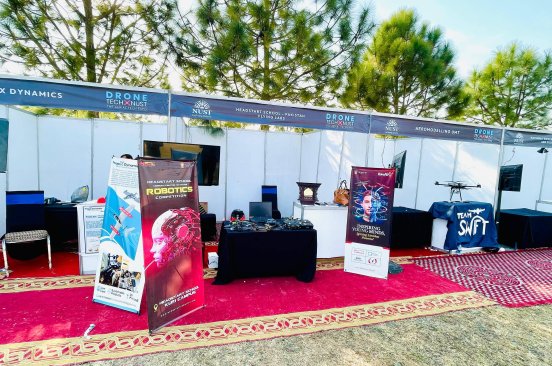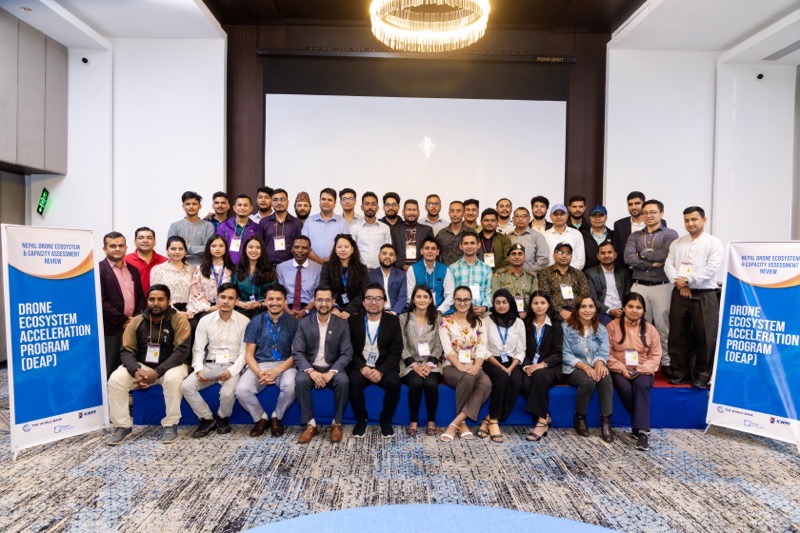
Advancing Nepal's Drone Industry: Key Insights from the Drone Ecosystem and Capacity Assessment Workshop
The workshop marked the inaugural interaction among various stakeholders representing government, NGOs, and the academic sector.
November 22nd, 2023
On October 18th, 2023, a significant milestone was achieved within the drone industry of Nepal as it marked the inaugural interaction among various stakeholders representing three distinct sectors: government organizations, non-governmental organizations, and the academic sector. With the aim of strengthening the drone ecosystem within the country, Nepal Flying Labs organized a one-day workshop titled "Nepal Drone Ecosystem and Capacity Assessment Review" under the Drone Ecosystem Acceleration Program (DEAP) in partnership with the World Bank. The one-day event was hosted at Hotel Vivanta, Kathmandu. The workshop brought together approximately 75 participants, representing 40 different organizations representing various fields linked to drone technology in Nepal.

The Presentations
The workshop started with Chairperson Mr. Siddhanta Neupane's welcome speech and opening remarks by the Joint Secretary, Mr. Buddhi Sagar Lamichhane. Mr. Lamichhane emphasized the significance of formalizing drone regulations in Nepal and also mentioned how various government agencies have united for the first time to establish a Drone Working Committee aimed at regulating the drone industry in Nepal.
Mr. Eguniwari Thamos, the climate change specialist of the World Bank, talked about the Nepal Drone Acceleration Program, and Mr. Uttam Pudasaini, the Executive Director of Nepal Flying Labs, presented the "Nepal Drone Ecosystem Analysis Study." These presentations marked the workshop's progression. Several representatives from governmental, private, and academic domains shared insights on the current status, challenges, opportunities, and potential advances in the sectors they belong to, providing a comprehensive understanding of the broader landscape.
- Government Sector: Government representatives from the Nepal Electricity Authority and the Land Management Training Center discussed drone-related projects and programs at their institutions. They also emphasized the need to carefully select the drones used for surveying and mapping, considering the required accuracy for different projects. This consideration is particularly vital as drone technology is not well suited for mapping densely vegetated areas unless equipped with specialized sensors.
- Academic Sector: The representative from the Academic sector shared the different drone-related capacity-building programs and trainings that are being done by different academic institutions in Nepal. The presenter also emphasized the lack of certified drone-related programs in academic institutions, underscoring the importance of developing a dedicated drone curriculum in Nepal.
- Private Sector: Multiple representatives from private sector organizations showcased a variety of drone projects undertaken by their companies. All the presenters expressed concerns about the lengthy permission process, especially during rapid responses in humanitarian emergencies due to natural disasters. The presenters also highlighted a couple of other challenges, such as the absence of insurance for drones and the lack of a drone certification agency. Consequently, they raised concerns about how these factors have hindered the professional growth of this sector in Nepal.
Engaging Group Discussions
In addition to individual sector presentations, we had a very interactive and highly engaging group discussion exercise. The participants were divided into different thematic working groups:
- Government organizations (drone application)
- Government organizations (drone policies)
- Private sector
- Academic sector
Group 1: Government Organizations (Drone Applications)
The Government Drone Application group, consisting of officials from various Nepali government departments, emphasized the need to address policy gaps, enhance collaboration with the private sector, streamline registration processes, and promote drone technology usage in the forest sector. They also stressed the importance of obtaining rosters from authorities like CAAN and MoHA for efficient implementation.
Nepal's government sector underutilizes drones due to the lack of comprehensive regulations, resulting in resource constraints, operational delays, and data management issues. The discussion revealed potential opportunities for drones, including enhancing surveillance, optimizing crop estimation, strengthening disaster response, and improving mapping. Recommendations encompassed the need for fostering collaboration across sectors, providing personnel training, establishing partnerships with external organizations, and creating clear, comprehensive drone policies and regulations to promote ethical drone use.
Group 2: Government Organizations (Drone Policies)
The Government Drone Policies group, composed of representatives from Nepal's government sectors, discussed the absence of dedicated drone regulations in the country. They highlighted the urgency to develop legislative acts and concrete legal frameworks. The group also touched upon the government's strengths, weaknesses, opportunities, and challenges in the drone sector.
The group discussion emphasized the need for streamlined, efficient procedures and suggested improvements such as streamlining the certification process for agricultural use, enhancing insurance policies, and creating a comprehensive drone portal. Their recommendations included enhancing public awareness, designating specific airspace for drones, streamlining certification processes, improving insurance policies, and creating a comprehensive drone portal to refine the regulatory framework in Nepal, focusing on efficiency and effectiveness.
Group 3: Academic Sector
Professors and educational experts from Nepal's academic sector were brought together for a discussion that shed light on the absence of specialized degree programs, resource limitations, and the necessity for an industry-aligned curriculum. Their presentation underscored the significance of partnering with experts, securing funding, providing practical experience through internships, and creating suitable training environments to nurture a skilled drone workforce and drive innovation in the field.
Additionally, the discussion exposed the current landscape and challenges in academic drone use, highlighting the scarcity of dedicated courses, resource limitations, and regulatory hurdles. To enhance academic drone programs and prepare students for careers in this evolving field, participants emphasized the importance of interdisciplinary collaboration, hands-on training, research opportunities, industry partnerships, regulatory education, and certifications.
Group 4: Private Sectors
A diverse group of experts and stakeholders from various sectors within Nepal's private drone industry convened for the group discussion. The discussion delved into multiple aspects of private-sector drone use in Nepal, including challenges, strengths, opportunities, regulatory compliance, safety, data security, ethics, community engagement, and future growth.
Participants highlighted communication challenges with the government and the potential for expansion through professional training. While the private sector's involvement with drones has grown since the 2015 earthquake, it faces resource, operational, and regulatory obstacles, including pilot training and complex flight permits. Nonetheless, the country's geomatics programs, low-cost drone manufacturing potential, and visa policies provide promising opportunities. To leverage these advantages and address challenges, recommendations were made, including specialized UAS pilot training, cross-sector collaborations, and the integration of drone education into school curricula, to strengthen drone innovation and usage in this emerging field.
This collaborative effort in the group discussions not only promoted teamwork but also facilitated a more comprehensive grasp of the challenges and opportunities associated with drone technology in Nepal.
A Space for Open and Dynamic Discussions
What made this event truly stand out was its function as a space for open and dynamic discussions. For the first time in Nepal, it fostered a genuine and open-way interaction between representatives from multiple stakeholders belonging to the drone ecosystem. Questions were raised, ideas were exchanged, and a meaningful dialogue emerged, paving the way for a more collaborative and informed approach to shaping the future of drone technology and regulations in the country.
In the days ahead, Nepal Flying Labs is committed to fostering an environment where innovation seamlessly integrates with drone technology. We remain dedicated to creating a conducive space for open, dynamic discussions and for all stakeholders to come together, share their expertise, and work collectively to shape the future of drone technology and regulations in Nepal. In regards to the project, we will conduct interviews with representatives from all the sectors, organize focus group discussions, and publish a comprehensive report titled "Nepal Drone Ecosystem and Capacity Assessment Review." We hope this report will serve as a strong baseline document that will help all sectors to properly plan their drone activities in days to come. We are excited about the journey ahead and look forward to making significant strides in the field of drone technology advancement in Nepal.
Category(s)
Location(s)
Recent Articles
View All »

Team Cameroon's Road to Victory at the First Global Robotics Competition 2025
